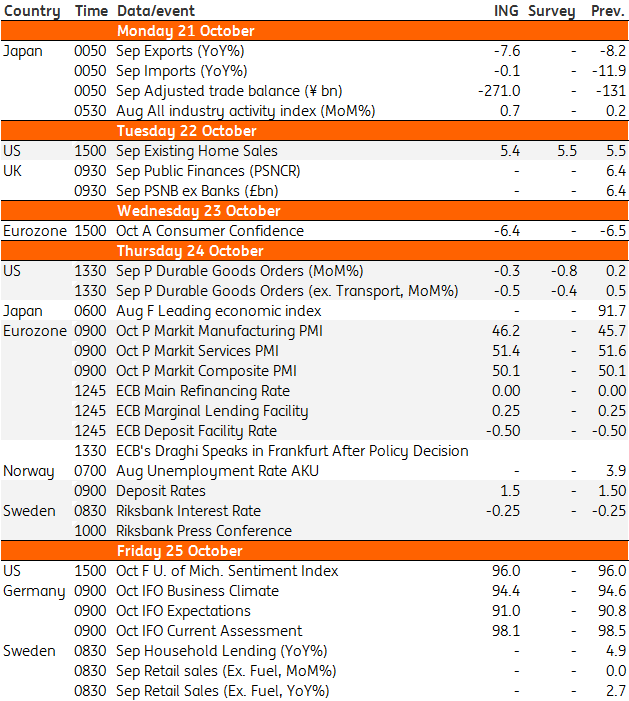Whether it’s Mario Draghi’s big farewell or the ongoing Brexit rollercoaster, the final pre-Fed data out of the US or Scandi central banks, there’s plenty to look out for in the developed markets next week
US: More 'insurance'
We await the final few data releases and Fed speeches ahead of the 30 October FOMC meeting, but we would need to see incredibly strong figures from what are largely second-tier releases to have any chance of preventing a third consecutive interest rate cut from the Federal Reserve.
With business surveys having fallen sharply in recent months, employment growth slowing and wage inflation stalling there is a growing sense that the US is now succumbing to the deepening global gloom.
There may be some positives from the housing numbers given consumer confidence continues to hold up for now and the fact mortgage rates have plunged in the wake of the decline in Treasury yields, but the durable goods orders report is likely to underline fears about a decline in investment given lingering trade uncertainty and weakness in key external markets at a time of dollar strength.
With both consumer and market measures of inflation expectations hitting new lows, we sense that there will be additional interest rate cuts in both December and January.
Brexit: What to expect on Saturday and beyond
By next week, we'll know whether UK Prime Minister Boris Johnson has succeeded in getting approval for his revised Brexit deal. The numbers will undoubtedly be tight.
But either way, an Article 50 extension looks necessary - whether it's to pass the follow-up legislation for a deal, or to allow time for a general election if the agreement is rejected.
On that latter point, there may well be an attempt to kickstart a general election campaign next week. But with the Conservatives flying in the polls, will Labour MPs be willing to give the government an opportunity to grasp a majority? That's going to be a key thing to watch over the coming days.
Read more on Saturday's vote, the possible Article 50 extension and chances of an election
ECB's meeting: Draghi's farewell & bickering
Next week’s European Central Bank meeting will be about two main things: Mario Draghi’s farewell after eight years at the helm of the ECB and an escalation of the controversy and quarrels within the Governing Council. One could clearly overshadow the other. In terms of policies, don’t expect any changes or any hints at further steps.
Eurozone data: It's all about confidence
This week is all about confidence numbers in the eurozone and despite some optimism around the global trade picture thanks to hopes of a Brexit deal and an intermediate deal between the US and China, confidence among businesses is likely to remain in wait-and-see mode. The big question is whether the composite PMI will dip below 50 for the first time since 2013, indicating contraction for the eurozone economy.
Riksbank to water-down rate hike ambitions
Back in September, Swedish policymakers hinted again that they could hike rates later this year or early next. But since then, the labour market is showing signs of fragility, while other leading indicators have turned lower. While inflation came in as the Riksbank expected last month, the outlook depends heavily on wage negotiations over the next few months. The deteriorating domestic environment could see a more lacklustre outcome than the Riksbank’s forecasts currently assume. That means the Riksbank is likely to push back the date of its next hike, but equally it’s probably too early to be pencilling in cuts – partly because of the ongoing weakness in the Swedish krona. A lot will also hinge on US-China and Brexit discussions over the next couple of months.
Norges Bank to signal they're done and dusted with hikes - for now
The Norwegian central bank has gone firmly against the tide this year, having hiked rates three times so far in 2019. That's been spurred by strong domestic oil-related activity, as firms benefit from break-even production costs that are noticeably below current market pricing.
But with global risks mounting, the Norges Bank has signalled a prolonged pause. That suggests no more tightening this year, but if we get some kind of global trade "truce" in 2020, and the krone stays weak, we wouldn't totally rule out a further rate hike next year.

Developed Markets Economic Calendar
Disclaimer: This publication has been prepared by ING solely for information purposes irrespective of a particular user's means, financial situation or investment objectives. The information does not constitute investment recommendation, and nor is it investment, legal or tax advice or an offer or solicitation to purchase or sell any financial instrument. Read more
